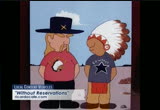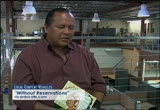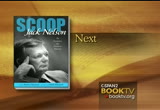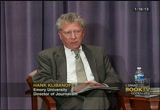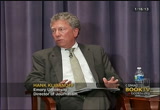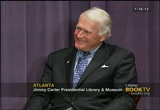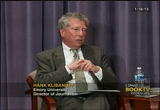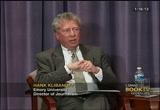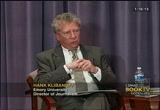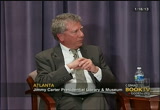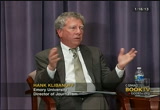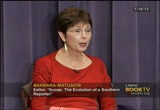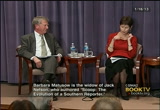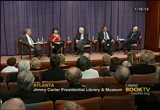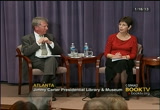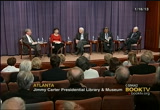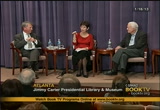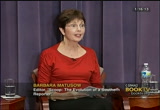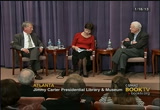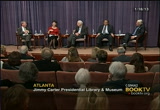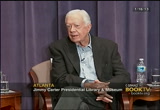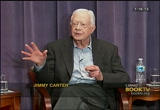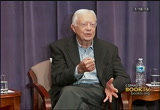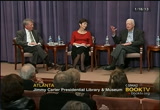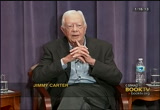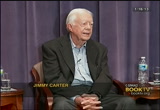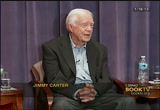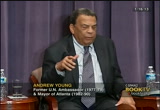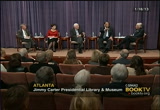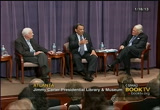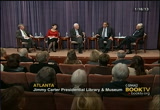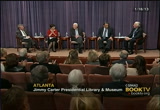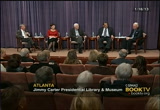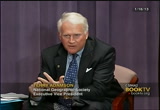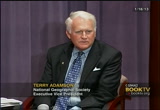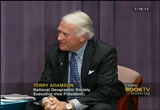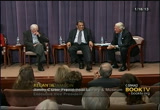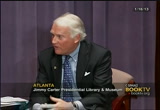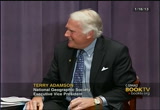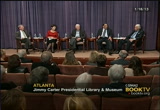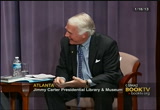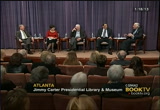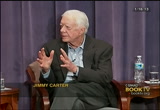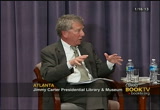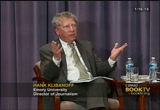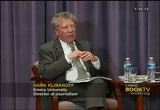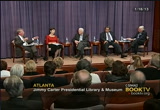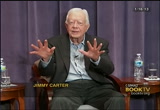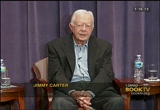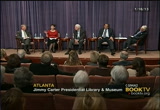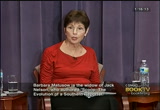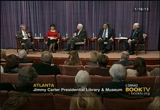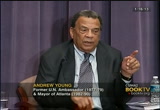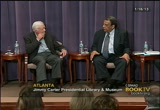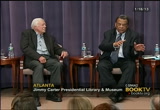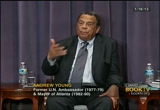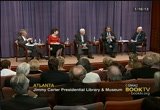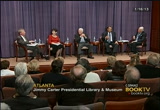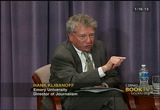tv Book TV CSPAN January 27, 2013 8:00pm-9:00pm EST
8:01 pm
and lived with the dominant culture and so some of the stuff that i've learned from that i put back in my cartoons. >> next on book tv, barbara matusow editor of scoop recounts the life and career of her late husband pulitzer prize-winning reporter jack nelson who died in 2009 at the age of 80. ms. matusow is joined by former president jimmy carter, former
8:02 pm
mayor of atlanta and u.s. ambassador to the united nations andrew young and former justice department spokesman terry adamson in the discussion of jack nelson's ms. moore "scoop the evolution of a southern reporter." it's about an hour >> good evening everyone. my name is hain't and i will be moderating this wonderful panel tonight. the director of the journalism program at emory and a co-author of a book about news coverage in the civil rights movement that featured jack quite prominently. first i want to thank the carter library and museum for hosting this and cosponsoring this and also emory university which
8:03 pm
houses the papers and the wisdom of a great journalists and we are so pleased that the to the surprise winners and the latest among them is jack nelson. barbara was generous and made jack's papers our possession now and there is some rich history and i encourage everyone to go and take a look at them. we are here to celebrate the life, memoir, peepers of jack nelson with some people that knew him extremely well. jack was a man of enormous influence and consequence in the nation. the story of jack nelson for those that don't know is the story of news reporting and of the latter half of the 20th century. if you look at his career, she
8:04 pm
was born in alabama just across the state line and moves to biloxi where he starts prattling newspapers. he was a newspaper boy, an honorable way to begin. it's how i got my start. [laughter] he gets his first job at the daily herald, an afternoon newspaper in the port and it's where i got my start. [laughter] she portrays himself quite openly as a goal reporter when you had a chance to look at it you will be as entertaining as we were by some of his early stories of falling for bruises and having great faith that everyone was telling him the truth as you find out later. as you develop their reputation it's very hard nosed investigative reporting which gets him beat up a couple of
8:05 pm
times and sends him fleeting to the atlanta constitution where he continued to get beat up. he did some breakthrough investigative reporting that we will hear about tonight. but beyond that, he was just a terrific gumshoe come he was a great reporter. it's easy to overemphasize that was investigated. his career was also about standing for the first amendment, and he worked with a number of organizations to help create a number of organizations that to this day are quite prominent for the freedom of the press. the student press law center all of which had his imprint on them. i want to say one last thing and then we are going to start talking about a story as many of you know. atlanta lost a great editor this week when gene patterson passed away down in st. pete, the editor of the atlanta
8:06 pm
constitution when jack was here and jean wants told the story about jack being a reporter, celebrated reporter when machine got a call from the publisher of "the los angeles times" and he said i'm thinking of the "los angeles times" wants to set up shop in alana. you have a big story brewing in the south. the civil rights story and the emerging south. and i need a reporter to set up the bureau in the "los angeles times." do you have any good reporters, and jean says you know mr. chairman we have a great reporters he purposely left off the name of jack nelson. he wasn't about to give him up. and a weak leader otas hired jack nelson that's how jack got to the "los angeles times" with great work here in alana.
8:07 pm
he brought investigative reporting to the civil rights story, which was elevated to ban all new level and move to washington and the bureau. they didn't figure it in print until jack got there and didn't have anything like it would with 17 reporters. the "los angeles times" the house that jack built. i'm going to turn to the wonderful guest. we have barbara matusow, jack's wife who took on the completion of "scoop." it was about 80% done. the alliance apart, the southern parts were pretty much done. she polish debt and it is just spectacular read. the florida state senator -- [laughter]
8:08 pm
president carter knew jack throughout his career and if you didn't know him directly you know this work and if i might just take a moment to point out i hope i don't embarrass you by mrs. carter. it's good to have you here tonight. [applause] it's certainly part of the movement by jack covered and was the subject of stories jack would have written as the ambassador to the u.n. and would have covered as the mayor of ballan tuck jack got to know him, and it is an honor to have you here as well, ambassador. [applause] >> terrie worked at the atlanta constitution of the same time jack got to know him better and got to know him extremely well.
8:09 pm
terry is an embrey graduate and was the editor of the emery wheel which we are very proud of and went on a to a number of different jobs including working in the justice department of the carter administration now as a special assistant to the attorney general griffin bell and as a spokesman he is now executive editor of the national geographic and it is a pleasure to have you back here, terry. [applause] >> i'm going to start with barbara, just because i think i want her to tell us what is this like? what is it like when you know, this is a moment that may be others that we knew what faced and you are faced with all of the papers and you are starting to go through them, what kind of an emotional experience is that,
8:10 pm
tells of the experience of going through. >> i must say what a pleasure and privilege it is to be on the same stage as president carter and ambassador young to and by the way, another to the surprise winner. [applause] >> also to say how pleased i am that jack's papers are here at emory. this is where they belong because you may not know what emory has an astounding collection but the curator here and he has a special deal as southern journalists and the of quite a distinguished -- one
8:11 pm
marshall. i'm proud that jack's papers are here while they be long but not to return to the question, actually initially i had a very negative approach towards jack's peepers but the experience didn't start out fairly well. when jack retired, he came back from -- he brought home with him about 20 boxes. he was an organized, he was opposed to disorganization. i started to help him in the papers. where do you think this one goes in the atlanta constitution or the administration.
8:12 pm
i gave up and i said it's all yours. i can't do it. the second reason that i had a negative impression is they brought full possession to the house. i decided that his more needed to be complete as a wonderful lead to an important book, but i knew that meant attacking his papers. i couldn't do it in either way. as with a very heavy heart i started going through them, and to my astonishment, i found these pearls and gems, you know, articles he had written about, speeches he gave, which were a mother lode of information, and i began to see that it was impossible to fill in the holes that he left. not only possible but
8:13 pm
pleasurable like a treasure hunt. i first compared it like a jigsaw puzzle when you are down to the last pieces and you see that they are going to fit, so it was a very enjoyable experience far from what i had expected. but the deeper i got into his papers, the more i learned about him. i really didn't know him in the days he was covering the south and making a legend of himself on the civil rights trial. she was married to somebody else at that time, but as i say, i learned a lot by reading all these things. one of the things i've learned is the toll that his career took on his family. his kids and grand kids are
8:14 pm
sitting out there in fact one great grandchild is here, and i think they could tell you better than on a come his daughter told me one time that he had been gone for so long that they put a sign up on the lawn that said welcome home daddy. [laughter] there were constant telephone threats, constant interruptions, no dinner went on without the telephone rang and they would send him out to the light again and there was a series episode after he broke the story on the protected lottery. the agency would come springing up to the house in the middle of the night. one thai policemen started approaching the house saying they heard the reports that he murdered his wife and there were lots of things or difficult to live through.
8:15 pm
one thing that surprised me as an investigative reporter he was the most impatient person. the granddaughter was of this to be driving up from florida today. i guess she is stuck in traffic somewhere. it is totally different when he was on the job. investigative reporting records enormous amount of patience and to bring down the lottery rain when he finally found for the operation when he finally found a neighbor he went door to door knocking on doors until a woman told him that there was an auto repair shop next door without too much although repair going
8:16 pm
on and copps coming back and forth. >> [inaudible] scan is that right? [laughter] then he proceeded to spend 11 days, not very far, just looking down over this supposedly auto repair shop and he spent 11 days document and the whole thing, watching them come and go and take money and brought a photographer of for him. when jack finished it, reporting the story, it was reported and as i say it took patience that kind of stuff on me. i knew that he was tough and tenacious but i actually didn't really understand the scope of the reporting. particularly in his days of corruption you might say at the atlanta constitution. just want to read you a little list of some of the scandals he wrote. the expos a on the illegal
8:17 pm
gambling cover in savannah, police protective houses in athens, elections fraud in the county, truck stops in rome, the mills in south georgia, state payroll padding, embezzlement of tax funds, confects for private work, nepotism from purchasing schemes such as the state board of leaks with no water. [laughter] on i could go on. many of these expos ase took place during the griffin administration which president carter can attest notoriously corrupt. they had never stolen so much. but ronald griffin was kind of day for giving sort of croak. quite a few years later she and
8:18 pm
jack and other reporters were drinking and marvin griffin said to jack you know how use to think every time i would see him walking into a press conference was a notebook, and jack said what? he said i used to think with that beady eye son of a bitch has on me today. [laughter] she used to pursue the story for the "l.a. times," and he was always -- i think we have to watch our time here so i just going to end by saying how happy i am that this book is published because she had such a wonderful career in washington it tended to overshadow this earlier phase of his career in the south, and this book although it ends halfway through his career, doesn't cover his career in washington except in an epilogue helps to cement his reputation
8:19 pm
and his co-author gene roberts called jack one of the most important journalists in the 20th century coming and i think that maybe the story of his life and his career to help cement that place in history. [applause] >> were you ever afraid of him? [laughter] tell us about your experience with him if he would, please. >> the remarkable events described in the book how many of you have read the book? how many of you are going to? i met jack when i was a peanut farmer and had no interest in politics and the atlanta constitution but carter was the
8:20 pm
editor that everybody in georgia began to know jack nelson as one of the most aggressive and aggravating and of all but i've heard described the most was pissant and that has a connotation that is always buried in what it ought not to be. [laughter] and exposing things that ought not to be exposed to decent people. so jack would do that, and he was dealing with incredible success sometimes under unbelievable danger for himself. the first time i think that he ever seeded georgia it was in the korean war and she became a
8:21 pm
staff sergeant if you never learn how to become a rival he was promoted from biloxi in the army and he did that because he was an expert at publicizing the great exploits. [laughter] and the editors are up and down the coast from savannah down to florida and so he finally went back over to the mississippi but at the time, he was asked to look for the atlanta constitution to the she was given a crash course in how to load a rifle. the last week he was in the army so he could get rid of that. he would get involved in the
8:22 pm
exciting and dangerous event and a community and at that time there was no legitimacy and the political system. it was shot at the absolute corruption every county had sufficed and supported and protected. it happened in the county as well and so he founded the ongoing crimes as well as those already mentioned and other things like bribery, and he would investigate and find people would get information and certify that the information was accurate and proven in court and he would bring it in the public so vividly that the law
8:23 pm
enforcement officials at the state level or somewhere would have to do something about it and when he got to the atlanta she had the whole state that was kind of a target and was the most horrible thing going on to hurt the people of georgia and was exposed of those embarrassing things that were not so jack told about that because of the same thing happens which was the home of jean became very determined in that county and exposed how corrupt the trod was and i think about 15 people were indicted, their names were never revealed that another thing is in 1962
8:24 pm
when they had been at the constitution i decided to run for the state senate. that's how it became famous to distinguish the prisoners like a jack over here with the election was stolen from me. he became a state senator because of it and he was always brazillian that i didn't call on him, but i knew jack pretty well and he wasn't in the forefront of reporting on the civil rights issue. he was supposed to be finding
8:25 pm
out crooks in georgia even at the top level of government, and exposing them in such a way that the deprivations of corrected and that's what he did. he concentrated on those individual things and the people in georgia would know that if they had experienced in their own community of some industry ten the basic principles of human rights the could call on jack nelson or their own state police in the county in the top levels of the governing levels in the fellowship this is the second juror was in the state senate and then came back for my last time in the state senator and from there went on the to be the employee of the l.a. times
8:26 pm
because the heady 50% increase in salary and the wife and three kids to take care of but then one reason why is she said i was not a crook. [laughter] >> i haven't had as much opportunity to be a crook as some people asked recognized him for his true work and before jack passed away a lot of the reporters that i had known as many news reporters as people in georgia who had the most integrity, the most personal courage and ability to expose
8:27 pm
the truth of any human being ever known. [applause] >> let me talk about another jack nelson because i didn't know this jack nelson. [laughter] donahey the problem and the civil-rights movement is that was people who were writing about us or making us the problem and jack never did that. i was just down in albany and just before christmas because it had occurred to me that it was exactly 50 years ago that i was down there and i started driving around and remembering things and quad in "the new york times" wrote to the obituary of martin
8:28 pm
luther king that non-violence was dead, it was rejected. martin luther king couldn't defeat, and the story really was that the kennedy administration wanted carl sanders to win in 1962 and there was a federal injunction that was placed on martin luther king. so we went up against laureate pritchard in georgia. we had to take on the federal government coming and we chose not to do that and jack always seemed to understand that we were not the problem. fi joost call "the new york times" quite a bit because they were -- well i think that they were being polluted by information that they were getting distorted information
8:29 pm
they were getting from hoover and they would come to talk to us like we were the ones that create all these problems in the south. jack never did that. he understood where the problem was, and he knew -- i always thought of him as a friend and anything that he ever asked me i knew that i could answer him candidly and truthfully and there would be no downside to it and there were quite a few. those days were rough on reporters. in 1964 in mississippi but bbc reporter that was the first one to suggest the story is that these civil rights workers were in hiding and the students were doing this just to get publicity
8:30 pm
and the abc reporter paul good humana associate with jack nelson, these were some good guys knew that we were not a problem so we love them and we felt that through them we could get our story told. i think that is still a problem with the press since then this all of this time analyzing the players, the democrats and republicans and nobody is talking about the issues. there was a danger in the civil rights movement also. and jack wasn't one of those the was trying to find the popularity, who was winning the popularity contest. was black power going to defeat martin luther king? he wouldn't write a story like that. he understood what the problems were in the south and he bored
8:32 pm
>> i have the to observe when this panel started in was barbara then president carter then dr. young is on the sheer politeness that i am still scheerer. [laughter] i sort of feel like the rest of the sandy koufax pitching staff. [laughter] but i did have the privilege to know jack well over several perspectives. i started even more green
8:33 pm
with the land the constitution when i was 21 years old, 1969. jack, he started when he was 23 years old, 1952. the dates are interesting the book is called the evolution of a southern reporter" evolution is the important part. jack was 23 years old. at 29 he won the pulitzer prize. and in 75 went to the "l.a. times." 1970 went to washington. young man. 65. 65, 70. he was a young man. he accomplished those wonderful stories but when i
8:34 pm
arrived he was still in into and still based their budget traveling all over with the movement at the time. those were not racially based. and this i learned from the book frankly the last door a jack covered for the constitution was in little rock when eisenhower in the federal troops and their desegregating central high school. as jean patterson said at the memorial service coverage jack was never deceived have a shot -- the same after that. with doctors and officials and the movement and he
8:35 pm
battled in justice and exposed it whenever it was started when he was 22 through the time when he died that is why i believe the first amendment, there is a myth that is shattered. when i arrived at the constitution that stated as gospel truth that jack did not stay at the atlanta constitution because the management would not give him a $5 raise. that is still being stated as true and as carter pointed out he got a 50 percent raise paid $10,000 sandy got 50,000 at the losses angeles times. it was not so bad as all of that but the other lower was
8:36 pm
the house that was known to a lot of people and jack tells them a wonderful story of the evening he said there. i will not say any more. [laughter] i pate met jack a couple times during that period. he does not remember but mr. president, you will appreciate this, we don't need to go into it but there was a certain candidate for governor in 1966 and was giving attention to. we had a use leadership retreat, it brought a lot of people all over the state to the downtown atlanta you worked out of the plaza. >> i did not own a hotel. [laughter] but jack came and spoke to
8:37 pm
that group. i actually have pitchers summer of jack speaking at that event. but my first real encounter was not the most pleasant after president carter was elected president his attorney general was working directly and a very contentious hearing for confirmation. my instructions were to say no press can ask any questions to griffin bell during the confirmation hearings because he cannot make any record. of course, jack is climbing over chairs, to get to bell and i am standing in his way making it difficult for him. they were old friends but i successfully blocked the former golden globe fighter from getting in the room. he had the last leg of the
8:38 pm
next day i get a call from the director of the omb and counsel to the president i am just waiting for the call to come for the of -- from the president i had mistreated him. [laughter] but it got better after that. but one thing that should be said from that perspective of the carter years, that jack was a great bureau chief and build a great hero. you said that, but i want to emphasize it. with all of our dealings with jack over that period, he was promoting the reporters of that bureau. they are famous. people used to run around the block not to see jack but say how about, have breakfast mr. attorney general? one time he got judge bill to invite chief justice burger who had never been to a breakfast to come and
8:39 pm
participate in the jack nelson was angeles times c-span which got invited at one time that elevated the process even more. >> they came regularly. >> that is a washington that no longer exist. >> the bureau's. >> the idea that people can get together to have an honest discussion over breakfast and c-span show it. [applause] and nobody felt the need to send to themselves. >> one last story, which is really a carter nelson's story. 1973 cover president carter just concluded his second year of governor of georgia. he made a decision and communicated i am told to his family and friends that
8:40 pm
he would run for president and in february he accepted the invitation to go to the national press club to make a speech. congressman and young was in the audience and jack nelson was asked to introduce the governor of georgia and it and his first speech on the vague national stage to strike teams from the hamiltons' memo and his own riding and other things he would try to stress when he came out of the closet on the presidential campaign. ambassador young he said this son of a gun is going to run for president. [laughter] there was a nixon and o based budget and all the
8:41 pm
things you would hear about and he closed by quoting bieber this old city of politics to establish justice in the central world and a chinese philosopher philosopher, you give the man of fish the fet gym how he can feed himself forever. but he has told this to the washington press corps and told peter to call jack in three days to probably told him he would run for president. and the governor was concerned this might be a little pretentious for a first term georgia governor to be quoting these guys. at the end of the first speech jack said don't worry about it, nobody gives a anyway. [laughter] >> that is a good story.
8:42 pm
[laughter] [applause] >> the most generic thing about jack nelson's career he follows the pattern of the south except but trying to find out where corruption was and where people were being cheated and exposing its and correcting it. but he did not really get involved in the civil rights movement and tell he went to little rock and these little black children were being abused and jack saw the expression on the faces of those little kids and i think that is when he decided he needed to move into the arena of racial relations because that was
8:43 pm
the story. that he really had not addressed before then. he is still not permitted to do that from the atlanta constitution and had to move to a bigger arena. and the "l.a. times" was ready to expand to be competitive with "the new york times." >> exactly. to your point*, this is not in the book but 1958 remember in terrible tarot county, there was a front-page story in the "washington post" by robert e. the baker who changed his
8:44 pm
name to that did not seem appropriate discussing how law-enforcement killed african-american men and wounded others in and it was up place of great fear for blacks and they could not go out on the street at night and it portrayed a very frightened situation. the front page of the "washington post." jack got sent down to do a story that defended the south and the integrity of the county and the white establishment. that is a story a reporter sees a number of african-americans and no one is expressing to this reporter any fear. they wouldn't. [laughter] but later they express great regret and they have not
8:45 pm
seen that for its validity and it had become the home town by to portray in a time and. >> but he made at that time. >> what does that integrity mean to be a journalist with integrity? we have got there a period of time where they disassociate themselves from people in politics that they lose touch with the political pulse and i a understand why that you do not want to be coopted. to talk about a question about your debate with president ford, he moderated
8:46 pm
and jack, a southerner was predisposed and a little southern loyalty the only question was despite the fact you're running for president al long time many americans still seem to be an easy. they don't feel they know you are the people around you for your of not reaching out to people with national experience into your campaign. the people you have known in georgia the relatively young and inexperienced and went on and on and on. having said that flash forward to the camp davis' story if you have you have the camp david accord and
8:47 pm
there's one person year ended up testing more than anyone? >> i wanted to have a meeting with more than just a couple reporters to tell them exactly what did happen between us and as a dog and to take time to do it in detail so i invited jack and another reporter over and i spent a couple of hours explaining to them what had actually happened and i had maximum had too much stress from anwar sadat and he was generous than the other was stingy. i told the truth about the whole situation. jack i found out later was taking meticulous notes and
8:48 pm
it was supposed to be off the record. [laughter] >> he would go into the restroom. [laughter] >> i did not realize it at the time and jack called midair to later and asked if he could report what i said. i said if you don't screw may. with words and to that effect. [laughter] i think when i was president i used better language. >> i think so word was embarrass me. [laughter] i don't know what the records said that he did right in meticulous detail but i did trust jack. i knew i dunno every reporter in the world but others that i would have
8:49 pm
trusted with my knife. i knew he would tell the truth and was courageous enough even under the most tremendous pressures and i read the book and i remember two or three times jack did back down on a story and regretted it until the end of his life. but those events were extremely rare and sometimes to put his job in danger i believe in this and this is what i am writing. he was a courageous man. >> before we make a saint out of jack. [laughter] let me say indeed he had great integrity but also a reporter which sometimes met pushing the envelope. i always liked the story had no how many remember the
8:50 pm
orangeburg massacre when the state troopers cut down unarmed students and wounded two dozen and killed four of them. jack was dispatched to the story and he immediately went to the hospital. and said to the administrator i am jack nelson for the beer and i am here to look at the medical records and the administrator thought he meant the fbi that jack knew perfectly well that was the impression he would wear a trenchcoat because it afforded them protection in the field. he was given access to the medical records and he showed most events were wounded in the backcourt on the soles of their feet and
8:51 pm
it was an important break in this story to disprove what the troopers had been saying that the students opened fire and threw molotov cocktails. that is what i mean by pushing the envelope. >> years after that he would tell that story on himself. >> sounds like a saint to be. [laughter] later it became -- became considered inappropriate you was reluctant to acknowledgement now he has done it again with "scoop." ambassador young, that massacre is one example of jack bringing investigative reporting to the civil rights story also the fbi involvement killing, the meridian bombing, the attempted set up by the fbi that led to the rest of the klansman, murder in athens.
8:52 pm
tell me the impact of having that type of news coverage on the movement had on the national understanding of what was going on. >> we really understood the press s educational media media, educational tv. everything that had been going on that we were involved in had been going on 100 years. it was very hard to get out. this was 1963, i was reminded fred came to get martin luther king on the 17th of december to promise he would come to birmingham this year because
8:53 pm
on the 14th f-15 to fred's church was bombed for the third time in 1962. the bombings of homes receive no publicity. but fred was quite frank that he needed martin luther king to come to get any attention to this injustice. another good friend that was with us was a cameraman was quite blunt with me about it saying you have to cut me some slack because i've got to keep the camera on dr. king. if they kill him and i don't get a picture of it, i lose my job. it was almost that cold and analysis wear -- where
8:54 pm
martin luther king knew he was being used to focus on this injustice. and did it willingly. at the same time guys like jack nelson understood that and the cameraman was lawrence peers who had been with a friend of martin's since montgomery. but it could not have been changed had not been for the press. the birmingham hotel put margins are rest on page 34. the reason we had demonstrations early in the morning so they could fly themselves to new york by 2:00 in the afternoon and make the 6:00 news.
8:55 pm
there was a delivery need for us to share with the press, to get the story out. >> the strategy behind it. >> yes. it was part of the message. we do we did not have the television, more than three minutes. by dr. king used to say you have three minutes on three networks. at that time, that was worth $1 million of publicity every day. there wasn't delivering offering of a risk that was incurred because we felt
8:56 pm
like we had to trust. there was nobody else that could get this story out. we could not even get a mass meetings announced on black radio stations. this self was nailed down real tight except for these incidents. coming back to griffin bell, the reason i mean i volunteered to testify at the hearing because i knew griffin bell was the one that got both sides of the school desegregation in a courtroom and said look, you know, more about atlanta's schools than anybody else, you work this out. when you get through, a call
8:57 pm
me, and i will make it a court order. [laughter] there was the trust and a realization that this was a real problem that had to be faced regardless of the risk that was taken. compare that with right now where people are writing about stories in such a way that they do better reporting on the falcons. [laughter] there is a more "in-depth" reporting. >> we like our falcons. >> to your point* earlier, for those to read the book i would point* you
8:58 pm
to the chapter that while no one ever would save the press was more on the front lines of danger than the people in the movement themselves. >> i would say that. >> but read the chapter you will see jack and the famous figure he used in people's just when the klansmen were threatening others with their life, they would invite them to a klan rally and then the clans people started to come in and say they're not writing what we are saying if there were surrounding them and had to call for a flying wedge to get them out and italy happened because gene was in the chest of a guy saying if you don't get this out of your life you will not like what you read in the lost angeles times tomorrow. [laughter] >> one quick factoid an
8:59 pm
important development through the press was the famous case "new york times" first it -- versus someone that had been added in "new york times" in the libel suit was brought by a public official and redefined constitutional law for the first amendment that was up by product from those that were on the front lines. >> and organizations that he helped to create depend so much on that. >> speenine. >> thank you. [applause] >> jack, 1959 went down to the state hospital and found horrible conditions, a
112 Views
IN COLLECTIONS
CSPAN2 Television Archive
Television Archive  Television Archive News Search Service
Television Archive News Search Service 
Uploaded by TV Archive on

 Live Music Archive
Live Music Archive Librivox Free Audio
Librivox Free Audio Metropolitan Museum
Metropolitan Museum Cleveland Museum of Art
Cleveland Museum of Art Internet Arcade
Internet Arcade Console Living Room
Console Living Room Books to Borrow
Books to Borrow Open Library
Open Library TV News
TV News Understanding 9/11
Understanding 9/11